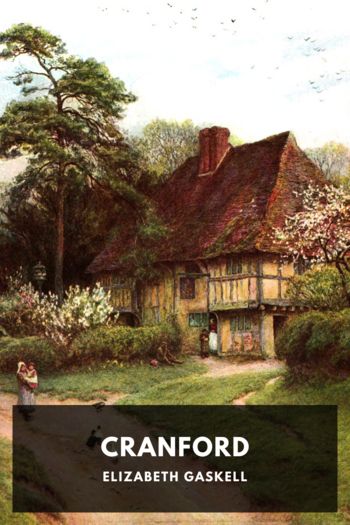Cranford - Elizabeth Gaskell (positive books to read .txt) 📗

- Author: Elizabeth Gaskell
Book online «Cranford - Elizabeth Gaskell (positive books to read .txt) 📗». Author Elizabeth Gaskell
Miss Pole ventured on a small joke as we went upstairs, intended, though addressed to us, to afford Mr. Mulliner some slight amusement. We all smiled, in order to seem as if we felt at our ease, and timidly looked for Mr. Mulliner’s sympathy. Not a muscle of that wooden face had relaxed; and we were grave in an instant.
Mrs. Jamieson’s drawing-room was cheerful; the evening sun came streaming into it, and the large square window was clustered round with flowers. The furniture was white and gold; not the later style, Louis Quatorze, I think they call it, all shells and twirls; no, Mrs. Jamieson’s chairs and tables had not a curve or bend about them. The chair and table legs diminished as they neared the ground, and were straight and square in all their corners. The chairs were all a-row against the walls, with the exception of four or five which stood in a circle round the fire. They were railed with white bars across the back and knobbed with gold; neither the railings nor the knobs invited to ease. There was a japanned table devoted to literature, on which lay a Bible, a Peerage, and a Prayer-Book. There was another square Pembroke table dedicated to the fine arts, on which were a kaleidoscope, conversation-cards, puzzle-cards (tied together to an interminable length with faded pink satin ribbon), and a box painted in fond imitation of the drawings which decorate tea-chests. Carlo lay on the worsted-worked rug, and ungraciously barked at us as we entered. Mrs. Jamieson stood up, giving us each a torpid smile of welcome, and looking helplessly beyond us at Mr. Mulliner, as if she hoped he would place us in chairs, for, if he did not, she never could. I suppose he thought we could find our way to the circle round the fire, which reminded me of Stonehenge, I don’t know why. Lady Glenmire came to the rescue of our hostess, and, somehow or other, we found ourselves for the first time placed agreeably, and not formally, in Mrs. Jamieson’s house. Lady Glenmire, now we had time to look at her, proved to be a bright little woman of middle age, who had been very pretty in the days of her youth, and who was even yet very pleasant-looking. I saw Miss Pole appraising her dress in the first five minutes, and I take her word when she said the next day—
“My dear! ten pounds would have purchased every stitch she had on—lace and all.”
It was pleasant to suspect that a peeress could be poor, and partly reconciled us to the fact that her husband had never sat in the House of Lords; which, when we first heard of it, seemed a kind of swindling us out of our prospects on false pretences; a sort of “A Lord and No Lord” business.
We were all very silent at first. We were thinking what we could talk about, that should be high enough to interest My Lady. There had been a rise in the price of sugar, which, as preserving-time was near, was a piece of intelligence to all our housekeeping hearts, and would have been the natural topic if Lady Glenmire had not been by. But we were not sure if the peerage ate preserves—much less knew how they were made. At last, Miss Pole, who had always a great deal of courage and savoir faire, spoke to Lady Glenmire, who on her part had seemed just as much puzzled to know how to break the silence as we were.
“Has your ladyship been to Court lately?” asked she; and then gave a little glance round at us, half timid and half triumphant, as much as to say, “See how judiciously I have chosen a subject befitting the rank of the stranger.”
“I never was there in my life,” said Lady Glenmire, with a broad Scotch accent, but in a very sweet voice. And then, as if she had been too abrupt, she added: “We very seldom went to London—only twice, in fact, during all my married life; and before I was married my father had far too large a family” (fifth daughter of Mr. Campbell was in all our minds, I am sure) “to take us often from our home, even to Edinburgh. Ye’ll have been in Edinburgh, maybe?” said she, suddenly brightening up with the hope of a common interest. We had none of us been there; but Miss Pole had an uncle who once had passed a night there, which was very pleasant.
Mrs. Jamieson, meanwhile, was absorbed in wonder why Mr. Mulliner did not bring the tea; and at length the wonder oozed out of her mouth.
“I had better ring the bell, my dear, had not I?” said Lady Glenmire briskly.
“No—I think not—Mulliner does not like to be hurried.”
We should have liked our tea, for we dined at an earlier hour than Mrs. Jamieson. I suspect Mr. Mulliner had to finish the St. James’s Chronicle before he chose to trouble himself about tea. His mistress fidgeted and fidgeted, and kept saying, “I can’t think why Mulliner does not bring tea. I can’t think what he can be about.” And Lady Glenmire at last grew quite impatient, but it was a pretty kind of impatience after all; and she rang the bell rather sharply, on receiving a half-permission from her sister-in-law to do so. Mr. Mulliner appeared in dignified surprise. “Oh!” said Mrs. Jamieson, “Lady Glenmire rang the bell; I believe it was for tea.”
In a few minutes tea was brought. Very delicate was the china, very old the plate, very





Comments (0)